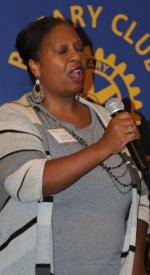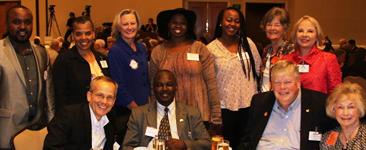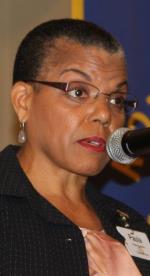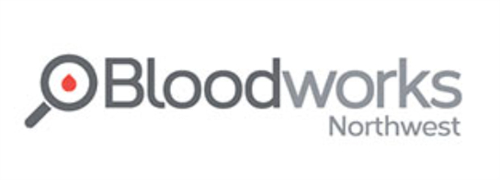Review of September 23, 2015
) Rotarians Hear of Breast Cancer Challenges and Progress
Rotarians Hear of Breast Cancer Challenges and ProgressReporter: John Hamer
 President-elect Cathy Gibson led the meeting because President Sue Nixon was on vacation in Paris. Marli Iverson, chair of the Music Committee, announced a special guest: Bridgette Hempstead, one of the day’s program panelists, had sung the National Anthem at a Seahawks-Cowboys game last year. So she sang it to us “a cappella” and received an extended standing ovation.
President-elect Cathy Gibson led the meeting because President Sue Nixon was on vacation in Paris. Marli Iverson, chair of the Music Committee, announced a special guest: Bridgette Hempstead, one of the day’s program panelists, had sung the National Anthem at a Seahawks-Cowboys game last year. So she sang it to us “a cappella” and received an extended standing ovation.George Twiss led the invocation, noting the fact that China’s President was in this Washington and the Pope was visiting the other Washington. David Woodward introduced a group of visitors from Kenya, and asked us to greet them in Swahili. Sarah Weaver, chair of the Fellowship Committee, announced several upcoming events. (See the Club Events schedule for details.)

Paula Houston, chair for the day’s program, first asked all breast cancer survivors to stand up. Several did. Then she asked those who had a relative with breast cancer to stand. Many did. Then she asked those with a friend or colleague with breast cancer to stand. By then nearly everyone in the room was standing. Paula said she had been diagnosed with breast cancer in 2010 and again in 2012. She had a good job, many friends and a supportive family, plus she lives in Seattle, which has some of best cancer care of any city. But she said treatment can be difficult for women of color and in communities with fewer resources. That led to doing her Ph.D. dissertation on breast cancer across different cultural and global perspectives, the topic of today’s panel.


Paula introduced moderator Penny LeGate, a documentary producer and TV professional, who introduced the panel:
- Bridgette Hempstead, CEO of Ciera Sisters, an African American Breast Cancer organization and a 19-year breast-cancer survivor.
- Dr. Julie Gralow, Director of Breast Medical Oncology at the Seattle Cancer Care Alliance and Professor of Breast Cancer at the U.W. School of Medicine.
- Dr. Patricia Dawson, a breast surgeon in the True Family Women’s Cancer Center at the Swedish Cancer Institute.
- Dr. Rachel Ceballos, an Assistant Member in the Division of Public Health Sciences at the Fred Hutchison Cancer Research Center.
LeGate showed a video on the “WE CAN” organization (Women’s Empowerment Cancer Advocacy Network), which was founded by Dr. Gralow. It works worldwide to dispel myths about breast cancer, especially in developing countries where many women don’t know that the disease is survivable although treatment resources may be limited.
“There are huge disparities throughout the world,” Gralow said. She is working with Rotarian Jim Moore to repair the only cobalt radiation machine that exists in Tanzania. “Once again, Rotary has a hand in saving lives in places you might not expect,” LeGate said.
She asked Gralow how a country like Tanzania can have only one hospital with such a machine, plus many obstacles to women getting the help they need. “There are so many barriers,” said Gralow. “Most women don’t believe that you can survive cancer. Why would you even think about early detection?” She said this was also true in Uganda, where the Fred Hutch has strong connections. “This is true all over the world, and it’s true in parts of the U.S. as well.” She added: “There’s stigma, there’s machismo, there are all these other barriers. In Africa, depending on what tribe you are in, you might be told that your husband should leave you and find another wife, because you’re not going to survive.”
.jpg)
LeGate noted that some African women who get breast cancer “believe that they’ve done something wrong as a curse from God.” Hempstead described a recent conference in Kenya, where many women came to learn more and “not give in to fear.” They then returned to their villages and worked with witch doctors in partnership with regular doctors. “You can’t fight their culture,” Hempstead said. “You’ve got to embrace new technology that will save their lives.” LeGate asked Dawson about the topic of breast cancer being “fairly taboo” not long ago. Dawson said: “There are communities in the U.S. where it is still considered a taboo subject.” A nationwide study by the Susan B. Komen organization found that some women didn’t return after an initial diagnosis because “they feel it’s a death sentence, or that they had done something wrong,”
LeGate asked Ceballos about resources in Latino and African American communities. “There’s a sense of deference to medical authorities,” Ceballos said. “You don’t ask any more questions or ask for more information. That would be considered rude.” She helps train women on how to query doctors. “By asking these questions, you’re actually helping them care for you and make better decisions for you.” LeGate noted: “A lot of us who are Caucasian also feel intimidated asking doctors questions.”
Hempstead recalled a doctor who told her that “because you’re African American you don’t need to worry about it, and you should come back in 10 years.” She sought a second opinion, and the result was a mastectomy and breast reconstruction. Later, she had symptoms of coughing, shortness of breath, and sharp pains. One doctor recommended further tests, but another doctor said it was “just a shadow,” and prescribed cough medicine. She followed the first doctor’s advice and was diagnosed with a re-occurrence. “Had I had not pushed, I know I wouldn’t be here today,” she said, adding: “The things that are happening today with women in our community are really criminal. We still need to advocate, and push through the barriers that are there because they are real. Women are being ostracized. People say ‘you’re no longer a woman,’ or ‘they’re trying to make you a man,’ or ‘it’s a curse from God.’ Those things are happening today, in 2015.”
LeGate asked Gralow about the declining death rate from breast cancer in the U.S., due to earlier detection and better treatment. Gralow said there are very high survival rates if it’s caught early. “But it’s not foolproof. Some women who have access to the best doctors, hospitals and nurses are still dying.” She added: “We’ve learned that breast cancer is a bunch of different diseases. It’s kind of like saying ‘infection.’ It’s a broad category. We have found a subtype that might be more similar to ovarian or pancreatic cancers. What we’re learning is that all cancers are different.”
Hempstead recalled a doctor who told her that “because you’re African American you don’t need to worry about it, and you should come back in 10 years.” She sought a second opinion, and the result was a mastectomy and breast reconstruction. Later, she had symptoms of coughing, shortness of breath, and sharp pains. One doctor recommended further tests, but another doctor said it was “just a shadow,” and prescribed cough medicine. She followed the first doctor’s advice and was diagnosed with a re-occurrence. “Had I had not pushed, I know I wouldn’t be here today,” she said, adding: “The things that are happening today with women in our community are really criminal. We still need to advocate, and push through the barriers that are there because they are real. Women are being ostracized. People say ‘you’re no longer a woman,’ or ‘they’re trying to make you a man,’ or ‘it’s a curse from God.’ Those things are happening today, in 2015.”
LeGate asked Gralow about the declining death rate from breast cancer in the U.S., due to earlier detection and better treatment. Gralow said there are very high survival rates if it’s caught early. “But it’s not foolproof. Some women who have access to the best doctors, hospitals and nurses are still dying.” She added: “We’ve learned that breast cancer is a bunch of different diseases. It’s kind of like saying ‘infection.’ It’s a broad category. We have found a subtype that might be more similar to ovarian or pancreatic cancers. What we’re learning is that all cancers are different.”
.jpg)
Gralow said the biggest breakthrough in recent years is that “less is more.” In the past, very aggressive surgeries, radiation and chemotherapy were often prescribed. Today there is less surgery with better results and also less chemo. LeGate asked about Angelina Jolie’s double mastectomy, which was both hailed and criticized. Dawson said if a family has BrCa1 or BrCa2 gene abnormalities, they may have an increased risk for breast or ovarian cancer. “For them, prophylactic surgery is the best option, but it doesn’t work for all women.”
LeGate asked about nonmedical support for women and their families. Ceballos said there aren’t enough resources for families, despite some support groups, Gilda’s Club, and camps for children. “People with cancer tend to be not as concerned about themselves as with their family members. They don’t want to share some of the emotional distress that they’re experiencing because they don’t want to be too much of a burden.”
She noted that the effects are not just during treatment. “It actually can last for decades afterward. Just like in any emergency, you react to that and when it’s over you finally have the time to process that emotionally. So they look to family members or have a very strong sense of isolation.”
During the Question & Answer period, Anna Liotta asked about hormone replacement therapy for menopausal women. Gralow said the Fred Hutch had done the most definitive study of hormones vs. a placebo. “If you have a uterus, there was increased risk of breast cancer and also heart disease. Women who didn’t have a uterus had no increase. Progesterone is the culprit. For decades, we gave too much hormone, and that was a mistake.” For post-menopausal women who get hot flashes and other symptoms, “we need to be careful, and give the lowest possible doses,” she said.
Larry Lang, a visitor to Rotary as the guest of Jim Moore, asked about the “universal taboo in Islam of a man examining a woman.” If there are no women doctors around, “How can you break down resistance to being examined in breasts or more intimate parts?” Dawson said there are many women doctors in Arab countries who do good work “But in male-dominated societies, the husband or other males make all of the health-care decisions. We have to respect the culture, but we also have to listen, provide support, and use our Muslim colleagues to address this. As a white Christian woman, I can’t go in and tell them what to do.”
Hempstead noted the need to build relationships with Muslim communities where women “are still very dominated by their husbands. They still have to get permission from their husbands to go in and see doctors.” Ceballos said that Latino communities often have the same problem. “Some women do not seek treatment for fear of their husband’s response.” She helps women hold “Home Health Parties,” adding: “It’s kind of like a Tupperware Party, but we provide education about various cancers.”
Interested in being a sponsor?
Download the website sponsorship guide
Download the website sponsorship guide
